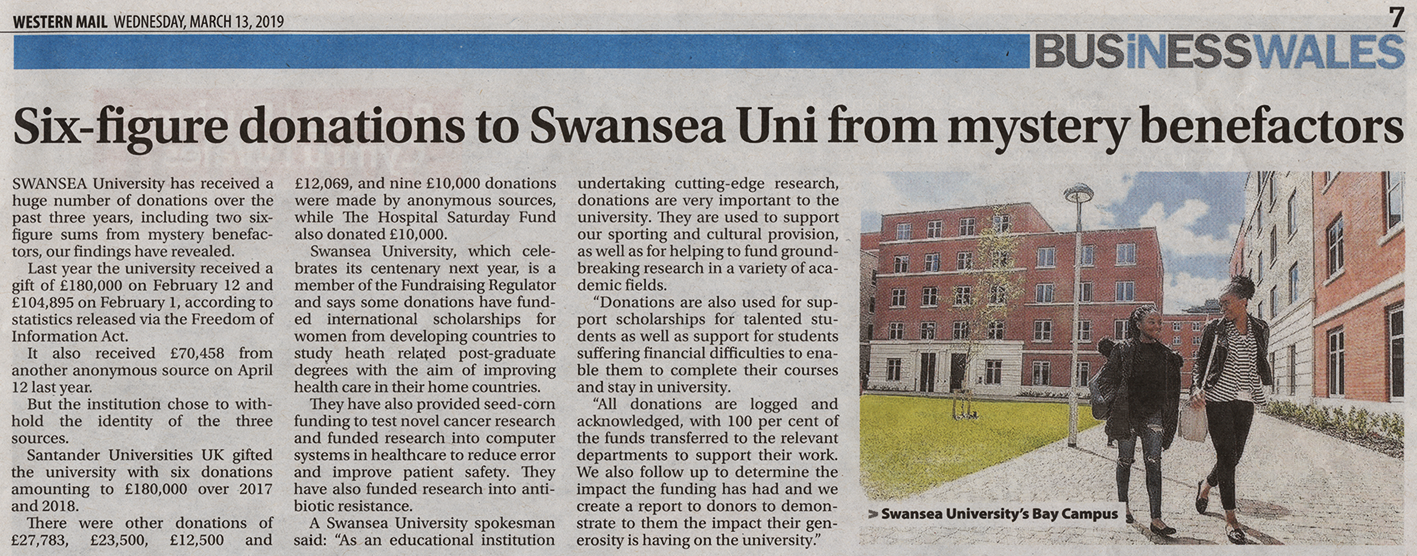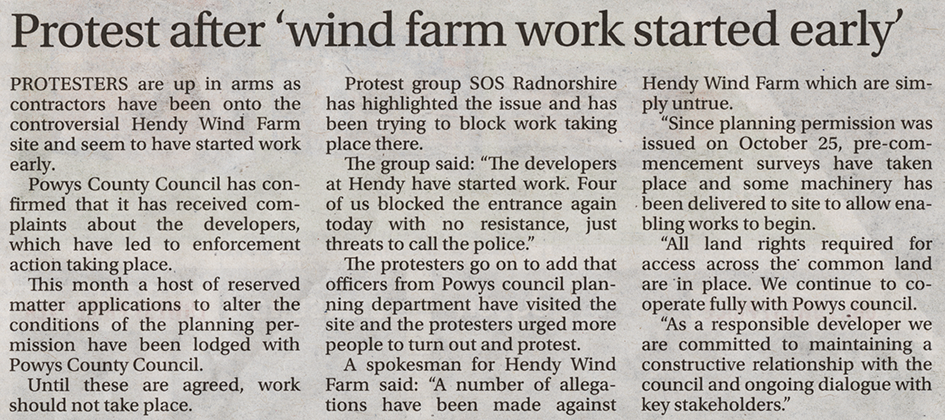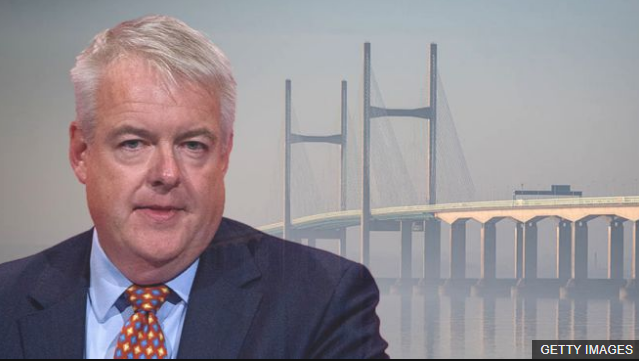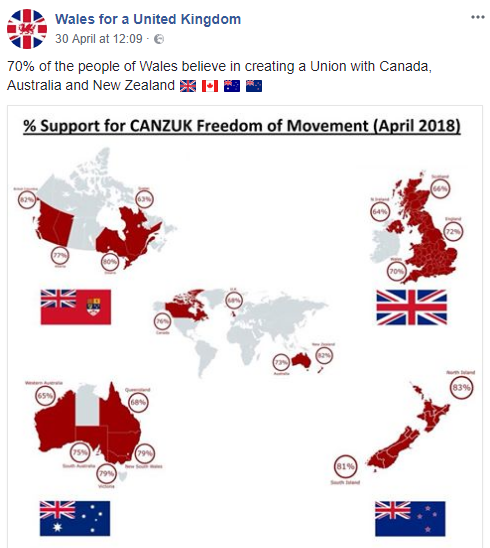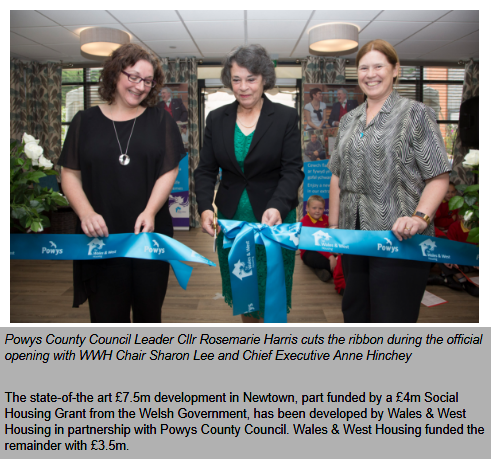PLEASE APPRECIATE THAT I GET SENT MORE INFORMATION AND LEADS THAN I CAN USE. I TRY TO RESPOND TO EVERYONE WHO CONTACTS ME BUT I CANNOT POSSIBLY USE EVERY BIT OF INFORMATION I’M SENT. DIOLCH YN FAWR
♦
![]() A story that’s taken up a lot of column inches and air time recently is the collapse of contractors Dawnus; which is sad in so many ways; lost jobs, another blow for my home town, and public money down the Swanee. (Or, in this case, the Tawe.) It’s this final consideration that seems to have exercised the minds of our tribunes and our scribblers.
A story that’s taken up a lot of column inches and air time recently is the collapse of contractors Dawnus; which is sad in so many ways; lost jobs, another blow for my home town, and public money down the Swanee. (Or, in this case, the Tawe.) It’s this final consideration that seems to have exercised the minds of our tribunes and our scribblers.
But the interest has been only superficial.
Here’s a piece from the Wasting Mule that seems satisfied to learn that two million pounds from a ‘Welsh Government’ loan of three and a half million has been returned, with the spokesperson confident that they’d soon see the balance.

From reading that article you might get the impression that there’s a single company called Dawnus which received just one loan. The truth is rather different, and quite confusing.
◊
MORE THAN JUST A COMPANY
There are no less than 10 companies bearing the Dawnus name (with another dissolved). Then there are other companies also operating out of Unit 7 Dyffryn Court, Riverside Business Park, Swansea Vale, SA7 0AP, not far from Junction 45 of the M4.
The full list of Dawnus companies with dates of their formation is:
- Dawnus Construction Holdings Limited (Originally Dawnus Construction Ltd) (07.06.2001)
- Dawnus Ltd (21.02.2002)
- Dawnus Sierra Leone Ltd (Originally Dawnus Developments Ltd) (14.01.2003)
- Dawnus International Ltd (Originally Dawnus Plant Ltd) (23.01.2003)
- Churchfield Homes Ltd (Originally Dawnus Homes Ltd) (06.01.2004)
- Dawnus Developments Ltd (Originally Dawnus Holdings Ltd) (20.10.2004)
- Construction Recyclate Management Ltd (Originally Dawnus Northern Ltd) (02.08.2005)
- Quantum Geotechnical Ltd (Originally Construction Geotechnical Ltd) (22.09.2011)
- Dawnus Holdings Ltd
- Dawnus Southern Ltd (08.04.2011)
- Dawnus Commercial Management Ltd (1) (20.02.2013 – 09.06.2015)
- Dawnus Group Ltd (02.09.2013)
- Dawnus Commercial Management Ltd (2) (24.08.2015)
- Dawnus Consulting Ltd (18.05.2018)
- Dawnus International Group Ltd (22.03.2019)
A number of things struck me when compiling that list. First, the sheer number of companies. Second, the way names seem to switch within the group. Third, Dawnus Commercial Management Ltd, why did it dissolve in June 2015 and resurrect in August, with the same director, Andrew Keay?
Come to that, who is Andrew Keay and why is he using the Dawnus name? All I know at the moment is that he also had his own company, Keay Cost Value Engineering Ltd, and this also went belly-up in July 2015.
Then, last Friday, a new company was formed, Dawnus International Group Limited, with its address given as, ‘c/o Acuity Legal Limited, 3 Assembly Square, Britannia Quay, Cardiff CF10 4PL’.
Acuity Law is well-connected in Cardiff Bay, and also with the higher levels of officialdom in Wales. Which explains why they’re lawyers for Carmarthenshire CEO Mark James. And they’ve done a great job of defending – nay, burnishing! – his reputation. Acuity will in no small part be responsible for the outpouring of communal grief that will accompany James’ retirement in June.
Of course most companies begin life using the address of an accountant or a lawyer before changing to a more permanent address, but I just find it significant that in this case it should be Acuity Law.
Now let us turn to loans made to Dawnus. Yes, there’s more than one.
◊
WHO OWES WHAT, AND TO WHOM?
The newspaper article I reproduced above tells us that the Cardiff Bay management team made a loan of £3.5 million to ‘Dawnus’ of which two million has been repaid. So there shouldn’t be much to worry about. Mmm . . .
Except that . . .
- Working our way down the list of Dawnus companies in the order seen in the previous section we find two outstanding charges against Dawnus Construction Holdings Ltd with ‘the Welsh Ministers’, delivered 28.03.2018, both part-cleared 02.07.2018. (Do these part-cleared charges account for the repaid £2m?)
- There is one outstanding charge against Dawnus Ltd delivered 28.03.2018.
- There is one outstanding charge against Dawnus Sierra Leone Ltd, delivered 06.04.2018.
- There is one outstanding charge against Dawnus International Ltd, delivered 28.08.2018.
- There is one outstanding charge against Churchfield Homes Ltd, delivered 28.03.2018.
- There is one outstanding charge against Dawnus Developments Ltd, delivered 28.03.2018.
- There is one outstanding charge against Quantum Geotechnical Ltd, delivered 28.03.2018.
- There is one outstanding charge against Dawnus Southern Ltd, delivered 28.08.2018.
- There is one outstanding charge against the Dawnus Group Ltd, delivered 28.03.2018.
So there are at least three charges.
But we need to be careful because when querying similar charges – with the Development Bank for Wales – for a number of companies run by the same individual, and asking why a company based in London had received funding, I was initially given the ‘group’ answer.

But in the example I was querying there was no group, just many companies run by the same guy, Jimbo Lynch of Cardigan (for it is he!).
And then I checked with Companies House and wondered why alarm bells didn’t ring in Cardiff when this appeared on the document –

Beachbay is a company that has bought and runs property in London, it should never have received funding from what was then Finance Wales. I’m now waiting for another excuse explanation.
It’s obviously much easier to make the ‘group’ argument with Dawnus, but if so, then which is the parent company? And even if the group explanation holds, there are still at least three outstanding charges; two delivered on 28.03.2018, and one on 06.04.2018 to Dawnus Sierra Leone Ltd.
Though this last one raises the question of whether the Development Bank for Wales should be funding a company that presumably operates in west Africa.
Newspaper and media reports give the impression there is just one company, yet we know there are many using the Dawnus name. This BBC Wales report only confuses matters further by (at the foot) introducing a company called Dawnus Liberia, which I can’t find anywhere.
Though an internet search for Dawnus Liberia turned up this article which mentions Legsun Building Services. The company is actually called Legsun Ltd, and is based in Cardiff. When I checked the Legsun directors I saw the names Timothy Alun Lowe and Nicholas Charles Down, names I recognised from the Dawnus companies.
In fact, Down was appointed to the boards of 12 companies at the Dawnus address on March 10/12 last year. Some of these companies do not carry the Dawnus name but are presumably part of the group. Companies like Ashridge Construction Ltd, Pond Bridge Management Company Ltd, Dyffryn Court Management Ltd and Medrus Plant Hire Ltd (that began life in 2011 as Port Talbot Tyres). To confuse matters, there is also Medrus Plant Hire (Swansea) LLP.
Apart from the LLP all the companies have charges against them – or are covered by the group charge – held by ‘the Welsh Ministers’ and delivered 28.03.2018, just two weeks after Down became a director for most of them.
Let us return to Legsun for a moment, where we found both Lowe and Down serving as directors. The accounts to 31.12.2017 record a loss of £4,147,000 on turnover of £9,298,000, compared with £1,184,000 and £17,496,000 respectively for the previous year.
Yet despite apparently being up Shit Creek, Legsun was able to settle three charges on March 14 with the National Westminster Bank, the very day it was announced that Dawnus was in administration. Did the money come from Dawnus Group Ltd, as is suggested in the extract below from the accounts?

And if so, was it simply moving money beyond the reach of creditors, or was there something else going on?
Nicholas Charles Down first appears in April 2016 as a director of three companies – Dawnus Southern, Dawnus Construction Holdings and Ashbridge Construction. In November we find him as one of the original designated members of Medrus Plant Hire (Swansea) LLP. He joins Dawnus Group Ltd in February 2017, and finally, as we’ve just seen, he becomes director of a whole raft of companies in March 2018, including Legsun.
So who is Nicholas Charles Down? Well, here’s his Linkedin profile which tells us that before joining Dawnus he was managing director of Laing O’Rourke for three and a half years.

You’ll note that Down’s Linkedin profile says he became a director of ‘Dawnus Construction Ltd’ in October 2015, but that name was not used after October 2013; Companies House tells us he became a director of Dawnus Construction Holdings Ltd 15.04.2016.
How do we account for this discrepancy? Was he there ‘undercover’ from October 2015 before becoming a registered director in April 2016? It’s possible, because according to his Linkedin profile he left his previous post at Laing O’Rourke in June 2015.
Though I can’t find Down listed as a director for any Laing O’Rourke company.
Someone else who got involved around the same time was Albert James Barclay, a Scot, who was director of Carillion Construction (West Indies) Ltd from June 2005 until August 18, 2017. That company was wound up in November 2018, a casualty of the more general collapse of the Carillion group.
Barclay has been, since 12.03.2018, a director of Dawnus Construction Holdings Ltd and, since 25.08.2017, a designated member of Medrus Plant Hire (Swansea) LLP.
◊
ALL PRESENT AND ACCOUNTED FOR?
The reason I decided to write this piece is because someone contacted me with rather disturbing information. As I’ve hinted, Dawnus did a great deal of work in west Africa, principally Sierra Leone.
This work was badly hit by the outbreak of Ebola, which began in January 2014. As a result of which a great deal of heavy machinery was shipped back to Wales and parked up in the Dawnus yard in Clydach.
One source insists that this heavy equipment accounted for a considerable part of the Dawnus group’s assets.
About a week ago someone popped down to the yard and mooched around a bit. It seems there’s a new security firm from Carmarthen on site and so the guard he spoke with couldn’t tell him much. But my mate wandered around, looked through the fence and estimated that the yard had room for a hundred or so sizeable machines, but there were only five there. It was clear that many of the spaces had recently been vacated.
Perhaps the intention always was that this equipment would return to Africa, and that’s what I’m told happened towards the end of last year when almost all the equipment was shipped out again, presumably back to Sierra Leone.

Which means that at a time when everybody – including suppliers, sub-contractors and ‘Welsh Government’ – knew that Dawnus was in deep, deep trouble, big money assets were leaving the country.
I can’t help but wonder if the numbers given on the part-repayment made by Dawnus Construction Holdings Ltd refers to heavy machinery. If so, then the part-repayment might have cleared them to be exported from August or September onwards.
But was Peter being robbed to pay Paul? Or to put it bluntly, could the loan in April – that no one seems to talk about – have funded the part-repayment in July?
This almost certainly links to the one constant in the Dawnus media reports, which say UK work has stopped but ‘overseas operations will continue’, or that only group companies operating in the UK are in the hands of the receivers.
But with a Byzantine structure like the Dawnus group of companies who knows what’s what? Does the ‘Welsh Government’ know which companies are in receivership? For nothing is filed yet with Companies House to say that any Dawnus company is in receivership.
◊
TRYING TO PUT IT ALL TOGETHER
If Sierra Leone and Ebola were the undoing of Dawnus, then the problems started at the beginning of 2014. But in fairness, Dawnus didn’t just cut and run; no, the company stayed and helped fight the outbreak. And the UK Government also sent help, including military personnel.

Let’s put together a little timeline to help us make sense of the events leading up to the Dawnus collapse and subsequent happenings:
- Up to 2013 things seem to be going well, at home and in Africa
- January 2014, Ebola outbreak begins in Sierra Leone
- Heavy equipment is moved from Sierra Leone to Wales
- The company’s financial health starts to suffer
- Late 2015/early 2016, Nick Down appears
- March 2018, the ‘Welsh Ministers’ loan Dawnus £3m
- April 2018, there is a further loan specific to Dawnus Sierra Leone Ltd
- From August/September 2018 Dawnus becomes noticeably slower in paying suppliers and sub-contractors
- From September 2018, it is reported that heavy equipment is leaving Swansea for Sierra Leone.
- March 13/14 2019, it is announced that Dawnus is in the hands of receivers
- March 14, 2019, loss-making Legsun satisfies three charges
- March 22, Dawnus International Group Ltd registered with Companies House
So what does that tell us? To begin with, it doesn’t tell us how or why – or at whose request? – Nicholas Charles Down got involved with Dawnus. One source is adamant that everything started to go pear-shaped with his arrival. Though I suspect that the writing was on the wall and Down was brought it to sort things out.
Turning to the ‘Welsh Ministers’. It’s obvious that their loan (or loans) is linked with Down taking control of so many companies in March 2018. It’s equally clear that this was never going to be enough to save the Dawnus group, it was just enough money to keep it limping along for a while.
Long enough for Dawnus to be restructured and the heavy equipment moved back to Africa. Though the ‘Welsh Government’ must have been aware of this, for it almost certainly explains the further loan, in April 2018, to Dawnus Sierra Leone Ltd. Should this loan have ever been made?
Among the known unknowns is new company Dawnus International Group Ltd, for the directors are names previously associated with the Dawnus group. So is the new company challenging the new regime?
Whatever street-fighting may still be going on in the ruins of Dawnus this whole business reflects very badly on the ‘Welsh Government’. For Dawnus was a major Welsh company and serious investment might have saved the group, but the miserably inadequate contribution made only delayed the inevitable. And the ‘Welsh Government’ knew that when it made the loans.
When I think of the money showered on every crook and chancer who crosses the border with a half-baked idea scrawled on the back of a fag packet it makes me angry to see that nothing was done to save a major Welsh company already in business, with good contracts, providing work for hundreds of our people.
Instead, the self-styled ‘Welsh Government’ appears to have encouraged, facilitated, and perhaps funded, the demise of Dawnus. The only question remaining is, was this done through malice or incompetence?
At the end of the day, for all those who’ve suffered, does it really matter?
♦ end ♦






